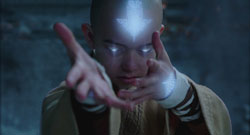In the press notes accompanying The Last Airbender, director M. Night Shyamalan says he’s always dreamed of making a big movie franchise a la Star Wars or Harry Potter. But I can’t see that dream becoming a reality. Airbender feels like an overt bid to kick-start a big-budget action-adventure franchise, but it doesn’t feel like a movie that actually deserves any sequels.
It’s pretty easy to pin the film’s failures on Shyamalan himself. The movie is based on an animated Nickelodeon series that was, for its three seasons, a hit with audiences, a ratings earner, and an award winner (include Emmys and Annies). The source material was more than up to snuff, a rich starting point for a big-screen adventure franchise. With its own epic mythology and enticing mixture of martial arts, fantasy, and character-building, this story could have worked well as a nice trilogy of summer blockbusters.
But alas, the once-promising Shyamalan, after making the modern-day classic The Sixth Sense and the dark, undervalued gem Unbreakable, is a director who seems increasingly consumed by his own ego, making movies that reek of the Shyamalan style but have none of the Shyamalan magic. Signs was a hit with audiences, but reviews were mixed; The Village is generally considered to be a letdown, and both Lady in the Water and The Happening met with such bad reviews, they were essentially D.O.A.
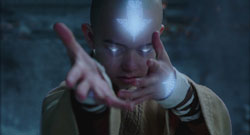
So Shyamalan has turned his attention from leaden, implausible suspense thrillers to a tin-eared, clumsy summer adventure; it’s a change of pace, but hardly a creative rebirth. To his credit, Airbender bears few stylistic similarities to his earlier movies, and rarely feels as though he’s trying to hijack the popular source material. That said, he’s been working in the suspense realm for far too long, and it shows here: Rather than being light and nimble, Airbender is dark, solemn, and self-serious—all the things most moviegoers don’t want in a summer adventure flick, particularly one geared toward families.
For those unfamiliar with the cartoon, Shyamalan spends plenty of time explaining the backstory. It’s a fantasy quest story in the Tolkien mold, set in a world that’s split into four nations—Fire, Water, Earth, and Air. Within each nation, there are a few preternaturally gifted conjurers called Benders, who are able to manipulate the element for which their nation is named (a practice the film portrays as a mixture of kung-fu posturing and mysticism). But there aren’t many Benders left, because the malevolent Fire Nation has waged war on the other three, gradually taking over the whole world and eradicating all other Benders as a way to maintain their power.
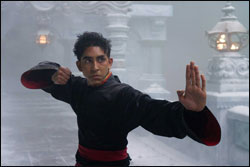
Enter the Avatar—a chosen, long-promised hero in the vein of Luke Skywalker or The Matrix‘s Neo. The Avatar is the only one who can bend all four elements—and thus, the only one who can restore balance to the world and end the Fire Nation’s evil domination. We are introduced to the Avatar early in the movie, and most of the movie follows his Frodo-like quest into the heart of enemy territory—aided by friends and beset by foes at every turn—through various battles, twists, and revelations.
If that sounds like a fair amount of plot to fit into one movie, it is—and the film is barely over 90 minutes. Actually showing us all of this would be too much, of course, so Shyamalan packs his movie with exposition and explanation; there are far too many scenes of new characters and plot twists being introduced not visually, but through other characters simply telling the audience what is going on.
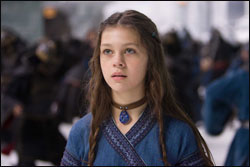
It’s one of many ways in which Airbender is crippled by its director’s own franchise ambitions; this is a movie that begins with text reading “Book One” and ends with a sequel-promising cliffhanger, and everything in between seems custom designed not to tell a story so much as to set up further stories for down the road. The whole movie simply goes through the motions of visiting various locales and establishing character backstories in a way that makes it feel like one overblown “origins” flashback.
And speaking of backstories, it’s worth mentioning that, well before the movie even screened for critics, it was the object of considerable scorn for the decision of the director and the studio to cast mostly white actors in the lead roles when the original characters were all of Indian descent. It’s hard to guess the actual motives of Shyamalan here—an Indian himself—and perhaps his hand was forced by the studio. Regardless, it’s not hard to imagine the casting decision as a move to help the film become a successful franchise launch in North America. Ditto for other decisions: Everything from the talky exposition to the overblown action scenes to the set pieces—some of which shamelessly ape similar, iconic scenes from Star Wars and Lord of the Rings—points to this as a film driven by concerns commercial rather than creative.
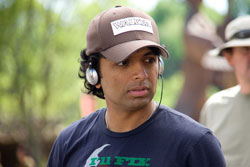
Shyamalan does capture some of the spirit of Star Wars here and there—but unfortunately, it’s never how you hope it would be. The acting is unbearably wooden; Slumdog Millionaire‘s Dev Patel (one of few Indians in the film), playing a sort of Darth Vader role, summons melodrama like a middle schooler trying to do Shakespeare. The dialogue is frustratingly on-the-nose, more inclined to explain the story’s mythology than to develop the characters, while it gives lip-service to Big Ideas like honor and responsibility without ever developing them fully. And it finds its philosophical footing in a sort of hodge-podge of Eastern religious idioms; my favorite example here is of a pair of mystical fish who exist to maintain balance in the universe. Their names are—you guessed it—Yin and Yang.
There’s no balance in The Last Airbender. It’s overblown and overly-calculated, a would-be franchise standard-bearer (and, for Shyamalan, career rejuvenator) that crumbles under its own self-important ambition and pandering. The irony is that the Airbender world really is fertile creative ground, and, with this initial exposition out of the way, one suspects that future movies could actually be pretty good—particularly if there’s some new talent involved. But going strictly on the merits of this flick, it’s hard to think of a good reason for a sequel. Which means that this may be both the first and the last Airbender.
Talk About It
Discussion starters- Do you think Aang is a responsible or heroic character? Why or why not?
- How would you characterize the view toward nature and the creative world that is shown in this film?
- The film’s philosophical slant is clearly influenced by Eastern religious thought; are there any components of the film’s philosophy that you think coincide with Christianity?
The Family Corner
The Last Airbender is rated PG for fantasy action violence. There is a fair amount of action here, but nothing in the way of blood or gore; there are, however, enough suspenseful or dark scenes that younger kids may be frightened. Also, parents might consider that there is quite a big of borrowing from Eastern religions here, including some Buddhist-like meditation, discussion of reincarnation and cosmic balance, and so on. It’s all portrayed as a part of the fantasy world, similar to The Force in Star Wars.
Photos © Paramount.
Copyright © 2010 Christianity Today. Click for reprint information.

